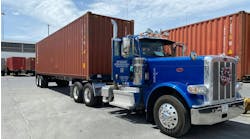The Biden Administration announced a slew of supply chain initiatives this week, including the launch of the Office of Multimodal Freight Infrastructure and Policy, a new agency to oversee the maintenance and improvement of the nation’s freight network. The plans were announced during the inaugural convening of the White House Council on Supply Chain Resilience.
The Multimodal Freight Office, funded by the Infrastructure Investment and Jobs Act, will oversee the development of the National Multimodal Freight Network, review State Freight Plans, and provide technical assistance to state and local governments, among other duties.
See also: FMCSA publishes final rule on broker financial responsibility
According to a release issued by the Department of Transportation, the new office will also contribute to the Freight Logistics Optimization Works program. The FLOW program, launched in March 2022 and operated by the Bureau of Transportation Statistics, is a federal initiative in which supply chain companies can enter into a data exchange to optimize network capacity by looking at information on specific nodes or regions in the supply chain. Companies must participate in data sharing to access FLOW. Over 50 companies have entered the partnership. Additionally, as the effort continues to mature, DOT will work with the Department of Agriculture to increase data transparency for containerized shipments of agricultural products, according to the White House announcement.
See also: Proposed driver overtime rule splits trucking stakeholders
“Our new Multimodal Freight Office will lead coordination of our work to strengthen supply chains—including the FLOW data initiative helping companies and ports make better-informed decisions—so that they can move goods more efficiently and keep costs down for Americans,” Transportation Secretary Pete Buttigieg stated.
The Multimodal Freight Office will also:
- Administer and oversee certain multimodal freight grant programs
- Promote and facilitate the sharing of information between the private and public sectors concerning freight issues
- Research on improving multimodal freight mobility and oversee the freight research activities of the various agencies within the department
- Assist cities and states in developing freight mobility and supply chain expertise
- Liaise and coordinate with other federal departments and agencies
- Carry out other duties as prescribed by the secretary
“Before the pandemic, supply chains weren’t something most Americans thought about or talked about. But today, after years of delay in parts and products, everyone knows why supply chains are so important,” Biden told press.
See also: How regulations affect the EV transition
“We’re doubling down on our work at home—starting right here, right now—with the launch of a new council on Supply Chain Resilience,” he said. “I’ve also directed my Cabinet to create an early warning system that uses data to spot supply chain risks to our economic security, our national security, our energy security, and our climate security.”
Additional White House supply chain initiatives
- Use of the Defense Production Act to make more essential medicines in America and mitigate drug shortages
- The development of the Department of Commerce’s Supply Chain Center will integrate industry expertise and data analytics to develop supply chain risk assessment tools. It will partner with the Department of Energy to analyze clean energy supply and with the Department of Health and Human Services to assess medicine supply.
- $275 million in grant selections for the Department of Energy’s Advanced Energy Manufacturing and Recycling Grant Program to invest in clean energy supply chains, including production of critical materials, components for grid-scale batteries and electric vehicles, onshore wind turbines, and energy conservation technologies
- $196 million in Department of Agriculture investments to strengthen domestic food supply chains
- The publication of the Department of Defense’s National Defense Industrial Strategy to guide policy and investment in defense-critical supply chains
- The launch of a quadrennial supply chain review, the first of which is to be completed by Dec. 31, 2024
- The launch of the Department of Homeland Security’s Supply Chain Resilience Center. Near-term priorities will address supply chain risks resulting from threats and vulnerabilities inside U.S. ports.



